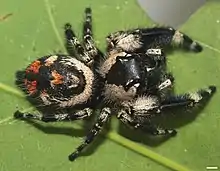Phidippus otiosus
Phidippus otiosus is a species of jumping spider that is found in southeastern North America. It is primarily a tree-living species.[1] Females reach a body length of about 16 mm. Its iridescent chelicerae can range in color from purple to green.
| Phidippus otiosus | |
|---|---|
 | |
| Female | |
 | |
| Male | |
| Scientific classification | |
| Domain: | Eukaryota |
| Kingdom: | Animalia |
| Phylum: | Arthropoda |
| Subphylum: | Chelicerata |
| Class: | Arachnida |
| Order: | Araneae |
| Infraorder: | Araneomorphae |
| Family: | Salticidae |
| Subfamily: | Salticinae |
| Genus: | Phidippus |
| Species: | P. otiosus |
| Binomial name | |
| Phidippus otiosus (Hentz, 1846) | |
| Synonyms | |
|
Attus pulcher | |
Life cycle
Females position their single egg sac under the bark of oak and pine trees.[2] These are laid from December to February in South Carolina, and from January to June in Florida. The egg sac can hold anywhere from 19-150 eggs, and the spiderlings (slings) will disperse between January and February.[3] The spiderlings mature during fall.
Systematics
Phidippus otiosus is grouped with the closely related species P. californicus, P. pius and P. regius in the otiosus group.[4]
Distribution
Phidippus otiosus naturally occurs in the southeastern United States from Florida and Texas to North Carolina.[5] However, this species is sometimes exported with plants such as Tillandsia, and has been found in countries as remote as Sweden[6] and Germany.
Name
The species name is possibly derived from Latin otium "leisure, peace, quiet" + the suffix -osus "full of, prone to", or from Ancient Greek oto- "ear", referring to the tufts of black hair.
A common name for this species is Canopy Jumping Spider.
Footnotes
- Roach 1988
- Phidippus otiosus "Canopy Jumper" | Tarantulaspiders Online
- Roach, Steven H. (1988). "Reproductive Periods of Phidippus Species (Araneae, Salticidae) in South Carolina". The Journal of Arachnology. 16 (1): 95–101. ISSN 0161-8202.
- bugguide.net
- Edwards 2004
- Salticidae.org: P. otiosus from Sweden
References
- Roach, Stephen H. (1988): Reproductive Periods of Phidippus Species (Araneae, Salticidae) in South Carolina. Journal of Arachnology 16(1): 95-101. PDF
- Edwards, G.B. (2004): Revision of the jumping spiders of the genus Phidippus (Araneae: Salticidae). Occasional Papers of the Florida State Collection of Arthropoda.
- Platnick, Norman I. (2008): The world spider catalog, version 8.5. American Museum of Natural History.
Further reading
- Edwards, G.B. (1980): Taxonomy, ethology, and ecology of Phidippus (Araneae: Salticidae) in eastern North America. Ph.D. dissertation, University of Florida, Gainesville.
- (1996): Metabolic rates of resting salticid and thomisid spiders. Journal of Arachnology 24(2): 129-134. PDF
External links
- Salticidae.org: Photographs
- Salticidae.org: Diagnostic drawings